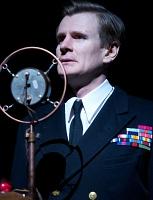The King's Speech
Following close on the heels of the film of the same name, this stage version of 'The King's Speech' seems to have arrived at its stage destination a little too early given the success of its filmic counterpart which opened in the UK only a little over a year ago in January 2011. The film was a huge critical and box office success, and won academy awards for best actor, best director and best screenplay for all the principals in the endeavour, as well as best picture. That is quite a tough act to follow, especially when the film would still seem to be fixed firmly in the recent memories of the public.
The play focuses on Prince Albert, the second son of King George V. Albert, also styled Duke of York and affectionately known as 'Bertie' among his family, never expected to be King because his elder brother was only 18 months older than him, and thus was likely to reign for a considerable time, and potentially have offspring who would take precedence. However, when Bertie's father dies and his brother David accedes to the throne, a constitutional crisis erupts when David wants to marry the divorced Wallis Simpson. Defiant and unwilling to continue as King without the support of the woman he loves, the King abdicates, leaving Bertie to take over the top job at 'the firm'. But Bertie has a dreadful stammer and seeks assistance from Australian wannabe actor, Lionel Logue, who is also a speech therapist, though without formal academic or medical qualifications.
Writer David Seidler became interested in King George VI's stammer when a boy as he also suffered from the same impediment. The play, though, is more than just an account of a man's desire to rid himself of a speech disorder as it also deals with contrasting classes, attitudes and manners in British society. The stuffy royal household are slaves to convention, and the same is true of the British politicians, as well as the church personified by Cosmo Lang, the Archbishop of Canterbury. The formality of the establishment is contrasted with Lionel Logue's down-to-earth, laid-back antipodean approach to life and therapy which , as if you couldn't guess, works the necessary magic on the King's vocal delivery.
Charles Edwards is the stammering Bertie, who never expects or wants to be King. Mr Edwards certainly has a strong resemblance to Colin Firth who took on the role in the film and Jonathan Hyde also has more than a passing likeness to Geoffrey Rush who played speech therapist Lionel Logue in the film. Those similarities may be coincidental, though I doubt it, but the leads maintain the fine standards set in the film, and there are tense and moving interactions between the two. Jonathan Hyde's Logue seems free of the conventional strictures which bind his royal patient, but what is interesting and striking is that he has rules of his own which he is obstinately determined not to wave for anyone, even royalty.
Joss Ackland makes a welcome appearance as the old King George V, who demonstrates his disappointment at his second son's failure as a speechmaker with brutal clarity. Ian McNeice ably convinces as Churchill, and Emma Fielding is the glamorous, if rather snobbish, Duchess of York.
Maybe the producers thought that the dawn of the Queen's jubilee year, or even the impending dawn of the Olympics, might raise fresh interest in the monarchy and, thus, the matter of the late King's speech impediment. Whatever the case, it still seems a little early to be revisiting this compelling story even if Adrian Noble's highly effective and considered production offers both an insight into the suffering of those with speech difficulties and the intrigue behind the abdication of Edward VIII. However, if you missed the film, or your memory needs refreshing, it is certainly well-worth seeing.
(Peter Brown)
"This is a slick, appealing package. ."
Henry Hitchings for The Evening Standard
Reviews cuttings from its pre-West End UK tour...
"Enjoyable play..."
Michael Billington for the Guardian
"Elegant, lucid and witty."
Charles Spencer for the Daily Telegraph
"Everybody has seen the film and the performances of Colin Firth...So what is the point... I arrived thinking that this was a redundant exercise and leave with the thought that good material responds well to different approaches."
Paul Taylor for the Independent
Originally published on
